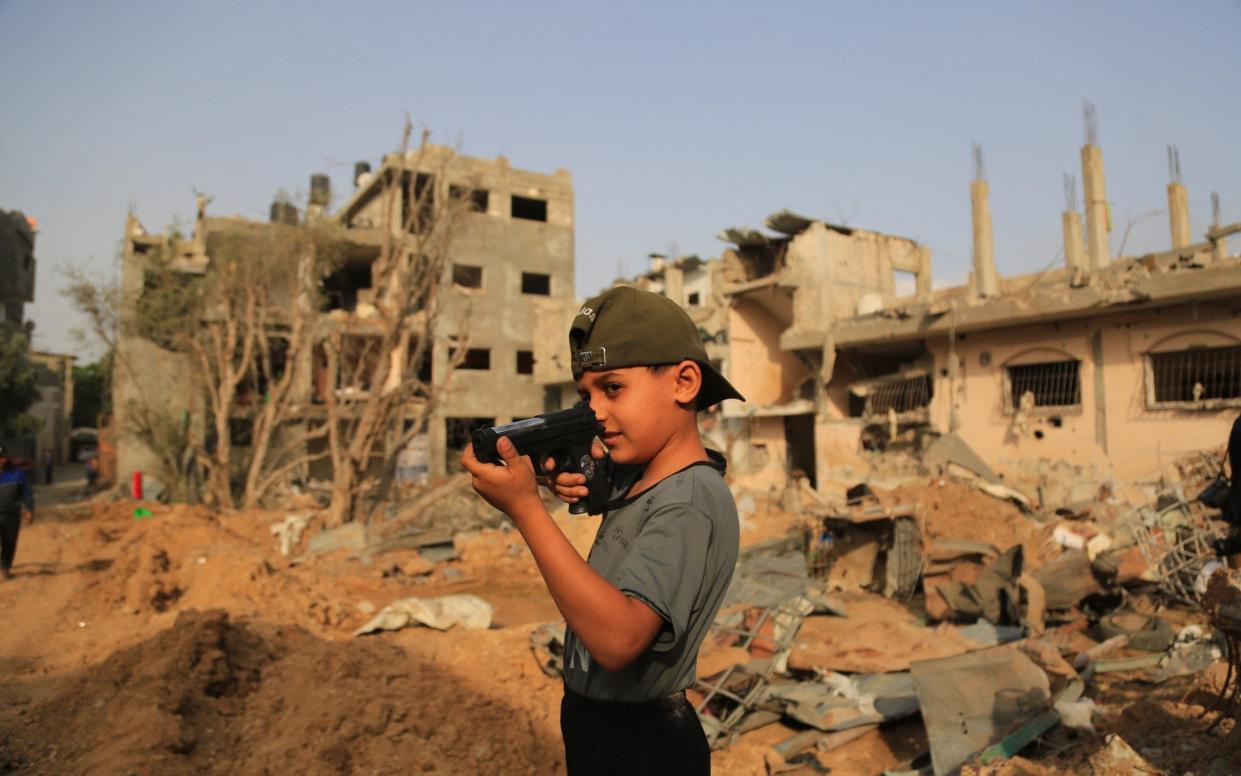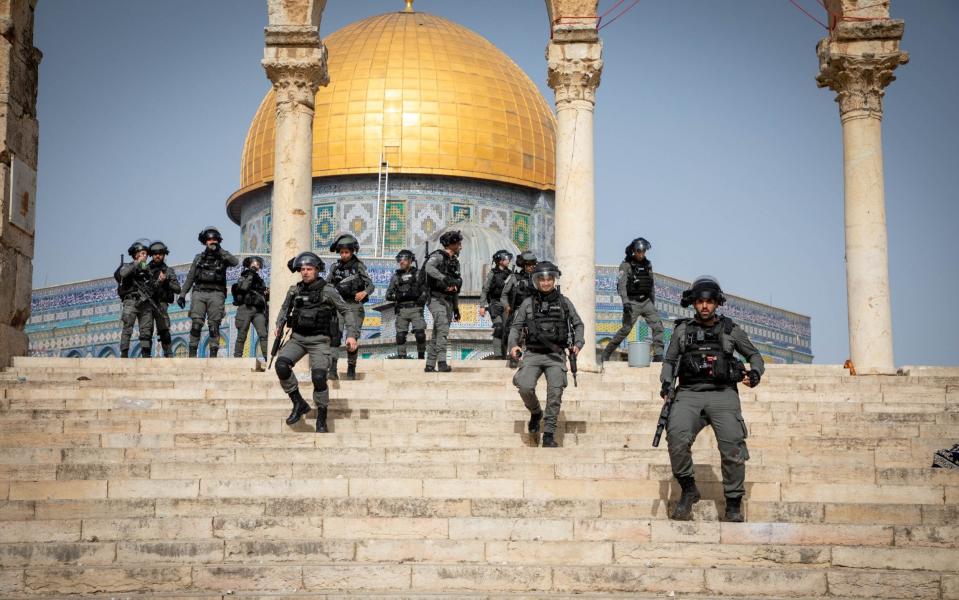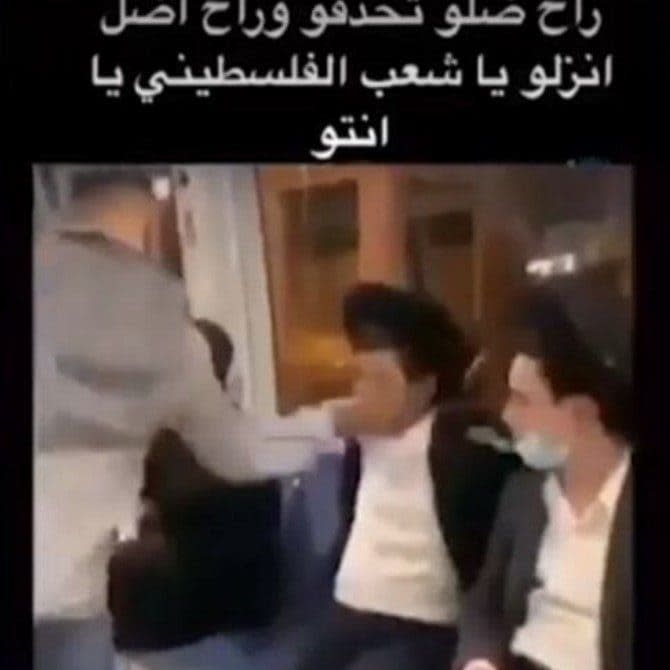Israeli and Palestinian leaders tell Nick Clegg to stop plague of misinformation

- Oops!Something went wrong.Please try again later.
- Oops!Something went wrong.Please try again later.
Israeli and Palestinian leaders have told Facebook's Nick Clegg to stop the plague of disinformation and hate speech that is fuelling conflict and driving street violence.
Ministers spoke directly to Sir Nick to demand Facebook take down posts that incited violence and respond swiftly to removal requests from his government.
“We are in a moment of social emergency, and we expect your assistance,” Benny Gantz, Israel's justice minister, told Sir Nick, Facebook’s vice‑president for global affairs.
In the battle to control the public narrative of the conflict, social media sites have become a hotbed for unverified content, research by the Telegraph has found. Falsified posts have been shared to thousands of people, tricking influential Cambridge University alumni and trusted journalists.
Whatsapp, the Facebook-owned encrypted messaging service, has become a place for extremist Israelis to plan violence against Palestinians.
One messaging group appeared with the title “Death to Arabs”. It told members to congregate in a town on Israel’s coast, named Bat Yam. Mobs were caught on camera later that night smashing car windows and assaulting Arabs.
A message from this young girl to the whole world ! this break my heart I promise you God will protect and set you free we love you ❤️ #FreePalestine #SavePalestine #GazaUnderAttack 🇵🇸 pic.twitter.com/YLPwmFFmRT
— Jared Ogden (@Jaredogden6000) May 12, 2021
On social media sites users often share details and explanations of the conflict written by others - usually people they do not know.
A video of a young girl with a tear streamed face begging for an end to violence was posted on Twitter. The clip gained 3,000 likes, was retweeted 3,500 times and called “heartbreaking” by hundreds condemning violence in Gaza. The footage was later discovered to have been recorded in Syria years ago.
Almost 17,000 people saw a photo of a distraught Palestinian man with a caption claiming he had swapped two of his children with two of his brothers in the hope some of each family would survive. The claim was re-posted by a Cambridge University alumni and Middle East expert, but our journalist inside Gaza found it to be fabricated.
A journalist followed by 10,000 people shared a video purported to show Israeli Jews celebrating the burning al-Aqsa mosque in East Jerusalem. “This video is a horrifying testament to what Zionism has done to Judaism,” the post read.
"أغرب ما فعلته اليوم هو أنني تبادلت أولادي مع أخي، أخذت منه اثنين من أولاده واعطيته اثنين من أبنائي حتى لو تعرضت لقصف الاحتلال يبقى من نسلي أحد ولو قُصف هو يبقى من ذريته..
وربنا يحفظنا ويحفظ شعب فلسطين"#غزة_تباد #غزة_تحت_القصف pic.twitter.com/rjGZvkgBhe— خالد صافي #فلسطين 🇵🇸 (@KhaledSafi) May 18, 2021
The claim was quickly debunked - it shows the annual Jerusalem Day march that ends in singing at the Western Wall. A crowd of young Jewish Israelis could be heard chanting an anti-Palestinian song, but it is thought that Arabs started the fire. The post remains on Twitter.
Another clip claimed to show a “Hamas rocket launcher parking in a civilian area to use humans as shields”.
“They want death of Israelis even if it means their own die too,” the user who posted the clip added. The clip was not recorded in Gaza, but released by an Israeli news outlet in 2018. The Israeli trucks were recorded because they had become lost in a village in the north of the country.
Palestinians in the Sheikh Jarrah neighbourhood have previously claimed social media posts were removed and accounts blocked after they voiced their opposition to eviction. More than 200 complaints about suspended accounts and posts relating to Sheikh Jarrah were made to 7amleh, a nonprofit organisation focused on social media, on May 10.
Last week Instagram removed posts naming the al-Aqsa mosque in Jerusalem after mistakenly associating it with a terrorist organisation, according to a leaked company message. Facebook, which owns Instagram, said in the message that “al-Aqsa” is often “included in the names of several restricted organisations”. Facebook later apologised and blamed the issue on a technical glitch.
Palestinian Authority prime minister Mohammad Shtayyeh accused Facebook of censoring Palestinian activists and failing to curb inflammatory rhetoric from hardline settlers in a summit on Tuesday.
Husan Zomlot, head of the Palestinian mission to the UK, said Sir Nick's team had apologised for blocking Instagram posts about violence at the al-Aqsa mosque and admitted that Facebook should not have treated words such as "martyr" and "resistance" as necessarily inciting.

Mr Zomlot told Time Magazine that executives had acknowledged an "inherent issue" with the company's moderation algorithms. “They promised they would revisit and reevaluate their framework,” he said.
A spokesman for Facebook said: “We will continue to remove content that violates our community standards, which do not allow hate speech or incitement to violence, and will proactively explain and promote dialogue on these policies to policymakers.
"We are also actively working to respond to concerns about our content enforcement. These meetings are an effort to ensure that all parties are aware of steps the company has taken, and will continue to take, to keep the platform safe.”
The company has set up a 24-hour rapid response team with native Hebrew and Arabic speakers, similar to teams spun up to monitor Brazilian and American elections, the Christchurch attack, wildfires in Australia and California, and the George Floyd protests last summer.

Israel's dedicated "Cyber Unit" has issued at least 1,340 removal requests to social networks since May 10, of which around 600 have been accepted. Facebook's approval rate was 46pc, lower than Twitter's 82pc and TikTok's 89pc, though Palestinian activists claim that it approved 81pc last year.
Some users were encouraged by a government-promoted app to mass-report pro-Palestinian posts and flood social media with coordinated content.
Sir Nick and his policy team were joined in talks with Israeli and Palestinian government officials by staff from video-sharing social media firm TikTok.
Weeks before the missiles started between Israel and Hamas, video footage of two Orthodox Jewish boys being slapped by a young Arab man was posted on TikTok and gained thousands of views within days.
Police said it was part of a social media “challenge” between young Arabs, with the winner being whoever got the most likes or views. It helped contribute to rising communal violence across Israel which in turn was one of the catalysts Hamas firing the first rockets at Israel earlier this month.

